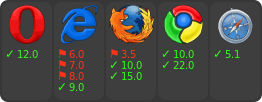|
|
||
|---|---|---|
| .. | ||
| example | ||
| lib | ||
| test | ||
| .eslintrc | ||
| .travis.yml | ||
| CHANGELOG.md | ||
| index.js | ||
| LICENSE | ||
| package.json | ||
| readme.markdown | ||
deep-equal
Node's assert.deepEqual() algorithm as a standalone module.
This module is around 5 times faster
than wrapping assert.deepEqual() in a try/catch.
example
var equal = require('deep-equal');
console.dir([
equal(
{ a : [ 2, 3 ], b : [ 4 ] },
{ a : [ 2, 3 ], b : [ 4 ] }
),
equal(
{ x : 5, y : [6] },
{ x : 5, y : 6 }
)
]);
methods
var deepEqual = require('deep-equal')
deepEqual(a, b, opts)
Compare objects a and b, returning whether they are equal according to a
recursive equality algorithm.
If opts.strict is true, use strict equality (===) to compare leaf nodes.
The default is to use coercive equality (==) because that's how
assert.deepEqual() works by default.
install
With npm do:
npm install deep-equal
test
With npm do:
npm test

